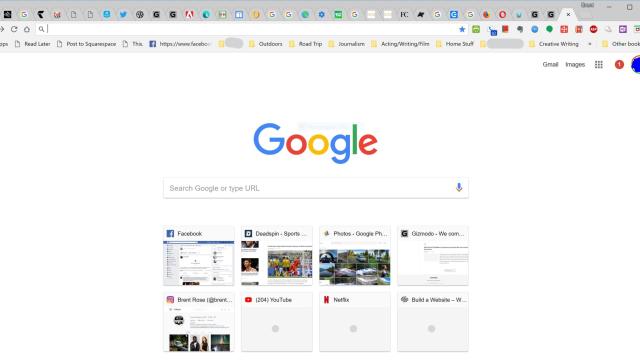So, Chrome is ten years old. Officially in the double-digits. Soon it’ll be getting wispy chin-hairs and its voice will be cracking. That said, Google’s browser has accomplished a lot in the ten years that it’s been around. It went from a latecomer in the Browser Wars, with just a 1-per cent market share early on launch, and now it’s the most-used browser in the world, with around 60-per cent market share. We thought we’d take a look back at the few of the ways it became so dominant.
1. The Omnibox
Kids, you’re not going to believe this, but once upon a time, web browsers had one field for entering the web address, and a whole ‘nother field for searching! Can you believe it? What a bunch of filthy animals we were back then. Anyway, when Chrome launched back in 2008, it really tried to emphasise a “clean, simple, and efficient user interface,” and one of the ways was to combine the URL box and search box into one. Suddenly users could type in a web address or just rattle off search terms in the same place. It saved a lot of clicking right from the get-go, and it’s only improved with additional auto-complete prowess. It’s gotten so it can even answer questions and solve maths problems before you hit Enter. “The Omnibox handles more than just URLs,” Google said in its comic book announcement to the world. “It also offers suggestions for searches, top pages you’ve visited before, pages you haven’t visited but are popular, and more… You’ll have full-text search over your history. If you found a good site for digital cameras yesterday, you don’t have to bookmark that site. Just type “digital camera” and get quickly back to it.” Ten years later, and it’s amazing how much I still rely on those features. It’s worth noting that all of that info would go back to Google by default, but you could opt to use other search engines (Yahoo, Ask, etc) if you wanted to.
2. Incognito mode
Google didn’t invent the concept of private (or more private) browsing. Apple’s Safari actually had a Privacy Mode Porn Mode.” It can be used for much more, though, including checking out websites and profiles through the eyes of an anonymous third-party or getting around the paywalls of news organisations.
3. Speed
One may forget that the biggest initial draw to Chrome wasn’t just that it was fast, it was stupid fast. Thanks to some very smart coding, Google claimed Chrome’s V8 JavaScript engine could process JavaScript ten times faster than Safari or Firefox, and an estimated 56 times faster than Microsoft’s IE7 (then the dominant browser). That kind of speed paved the way for better in-browser apps, such as email, calendar, and spreadsheets, which of course Google would
4. Each tab is its own process
This is one of those giveth/taketh away situations. Chrome took the revolutionary approach of making every single open tab be its own separate process. That meant that if a website had some bunk code, it would just crash the one tab, and leave your other 19 open tabs alone and functioning normally. That resulted in way fewer full browser resets, and as long as your computer had sufficient RAM then each tab was much less prone to lag than in other browsers at the time. The other side of that coin means that Chrome can hog a metric shit-ton of your computer’s memory, especially if you’re prone to having a lot of tabs open at once like I am. To Google’s credit, it’s done a lot in the last couple years to minimise the amount that background tabs can tax your system and battery life, but it still has many rivers to cross on that front. Other browsers, such as Opera, now also feature this each-tab-is-a-process approach, but most are built upon the open-source Chromium architecture.
5. Making the web less annoying
It’s easy to start ranting about how much the web sucks these days, but the truth is that it used to suck much worse. Like, remember auto-play videos that used to blare some stupidity into your eardrums for 30 seconds before you could even figure out what tab they were coming from? Chrome made it so you could mute those videos by default across a whole domain. Or how about extremely pesky popup and banner ads? Maybe fake play buttons that took you to a sketchy website? Google gave websites 30 days to comply with a set of web standards, and if they didn’t then Chrome would automatically start blocking offending adds. That’s how a 60 per cent market share can choose to use its leverage to force people to change their evil ways.
6. It’s the first browser to become an OS
How’s this for a claim to fame: This little web browser became the basis for a whole operating system. Firefox, IE, Safari, Opera… none of them can claim the same. It’s not an insignificant operating system, either. Chrome OS runs Chromebooks, which account for roughly 60 per cent of all of the mobile devices being shipped to K-12 schools in the United States (as of Q4 2017). That will represent a first computing experience for many of those kids at a very formative time in their lives. Whether that will pay off down the line for Google remains to be seen.
